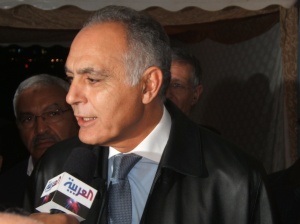Updated
Moving Towards Results: Morocco Elections Tomorrow — by J. AbiNader


 The crowd was upbeat, almost boisterous. Media followed every candidate and party official as they enter “Paradise,” an entertainment complex in Casablanca. I’m sure that some thought the venue quite appropriate! This was the final political meeting for the RNI (Rassemblement National des Independants) and the leadership exhorted those present and beyond to make sure that voters turned out tomorrow. Pictured here is the party president, Salaheddine Mezouar, the current Minister of Economy and Finance, who many believe could be the next Head of Government under the new Constitution. That would suit many of the 13+ million registered voters just fine as he has a track record and public persona that is reassuring to those who want to show that Moroccans are indeed up to the challenge of assuming greater authority over their legislative and executive affairs.
The crowd was upbeat, almost boisterous. Media followed every candidate and party official as they enter “Paradise,” an entertainment complex in Casablanca. I’m sure that some thought the venue quite appropriate! This was the final political meeting for the RNI (Rassemblement National des Independants) and the leadership exhorted those present and beyond to make sure that voters turned out tomorrow. Pictured here is the party president, Salaheddine Mezouar, the current Minister of Economy and Finance, who many believe could be the next Head of Government under the new Constitution. That would suit many of the 13+ million registered voters just fine as he has a track record and public persona that is reassuring to those who want to show that Moroccans are indeed up to the challenge of assuming greater authority over their legislative and executive affairs. The other picture captures the primary challenge faces those who are elected…leadership. It is M. Amine Behkhadra, RNI party leader and current Minister of Energy, Mines, Water, and the Environment, who is among the handful of highly skilled technocrats who are leading government efforts towards greater efficiency, and creating incentives promoting significant opportunities for local and international companies in renewable energies, green environment, and mining sectors. Her future in government is dependent on the bargaining among the winning coalition parties (Morocco’s voting system makes it unlikely that a majority party is possible), and so she could become a casualty of Morocco’s energized democracy.
The hundreds or more who are in the “political meeting” do not have placards, styrofoam hats, candidate buttons, or banners. They are well-mannered, listening to the speakers, and carrying on sidebar conversations, texting, and talking on their phones…so many similarities!! We exchange pleasantries. They are interested that I have come from Washington, DC to talk with them. Nevertheless, they avoid answering my questions about outcomes, priorities, key issues, the opposition, and the impact of elections in the region, from Spain and France to Tunisia, Egypt, and Libya. Amid the uncertainty of a region in transition, on all sides of the Mediterranean, they want to focus on what they know…that people need to vote and then we can talk about the future. There is optimism that parties participating in the elections are true Moroccans, which equates to supporting Allah, King, and country. No one here wants a revolution, but there is a definite desire for change for the better. As a 20-something explained to me, the young people and demonstrations got it half right–government has to change, power has to be redistributed, and the Palace has to trust the decision of the people. Where they went wrong is to think it can happen without changing institutions from within…that is the best way for Morocco, and it is why she is in the RNI.
This echoes the discussion I had earlier in the day with a group of business professionals. They are concerned that the speed of this year’s reform process and the election has made it a contest about numbers of votes and not about thoughtful policies to guide the country’s future. When asked, they said they are all planning to vote and encourage family and friends to do the same. We argue about defining democracy by voting tallies without attention to the other key principle of democracy, the rule of law. It is a spirited and entertaining discussion, moving from frustration over the weaknesses of the current government to uncertainty that enough change come soon enough to keep up with the country’s needs.
I am thankful today for having been in Morocco and talking to literally hundreds of people about their hopes for the future. As an occasional visitor to the region for more than 30 years, it is stunning to literally feel the desire for progress that is vivid across generations and genders. In this election, Moroccans are making choices that may determine their future in dramatic and historic fashion. It is heady stuff this democracy.
Comments are closed.